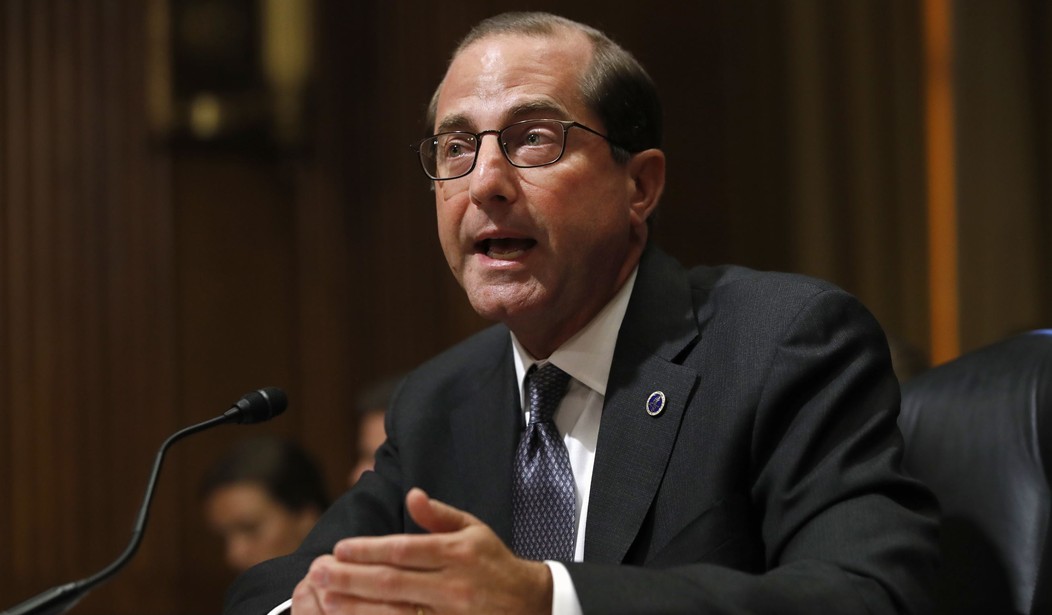On the campaign trail, President Trump promised he'd work to reduce prescription drug prices. Thus far, he's been a man of his word.
The president has proposed capping out-of-pocket costs for seniors, offering free generic drugs to certain low-income Medicare beneficiaries, and even targeting middlemen in the drug supply chain that pocket savings instead of passing them onto patients.
In a recent speech, the president took aim at a related problem: ending the "global freeloading" that has forced Americans to subsidize drugs in foreign countries. He noted that "Americans pay more so other countries can pay less. It's wrong. It's unfair."
He's right. Unfortunately, Department of Health and Human Services Secretary Alex Azar just cooked up a plan that would reward these freeloaders rather than punish them. The proposal features the same socialist practices that President Trump despises. If implemented, it would deny Americans access to critical treatments and discourage future medical innovation.
Azar's proposal impacts Medicare Part B, the part of Medicare that pays for advanced cancer treatments and injectable drugs to treat complex chronic conditions. On average, these drugs cost about 80 percent more in the United States than in other industrialized countries.
There's a simple explanation why these drugs are cheaper abroad. Many developed nations with government-run health systems refuse to cover medications unless drug companies offer massive discounts. Some even threaten to steal drug companies' patents. They essentially hold American drug firms hostage and give them no choice but to sell at a below-market price.
Recommended
Some companies cave in to this bullying. And some don't -- which means their products aren't available to patients in those nations. Consider that 88 percent of all medications approved worldwide between 2011 and 2018 are available in the United States. That's compared to just 66 percent in the United Kingdom, 49 percent in Canada, and 24 percent in Portugal.
Azar wants to copy other nations' bullying tactics. He has proposed an "international pricing index," which would set Medicare Part B drug reimbursements based on the average sales prices in 16 nations, most of which are in Europe. Azar projects overall savings of $17 billion over five years.
His plan is terrible news for patients. Importing Europe's socialist price controls would inevitably import the continents' restrictions on which medicines patients can access. Consider that 95 percent of new cancer medications are available in the United States, but just over half are available in the 16 reference countries included in the international pricing index.
The proposal would also discourage long-term drug development.
Pharmaceutical innovation is expensive. On average, it takes over $2.6 billion and a decade to create a new drug. Just 12 percent of drugs entering clinical trials successfully make it to market. Companies are only willing to take the plunge into this risky investment with the promise of worthwhile profits.
Price controls undervalue medications, undercut innovators, and make it impossible to sustain new drug development.
Just look to Europe. In 1986, the continent collectively spent 24 percent more than the United States on biopharmaceutical research and development. But socialist pricing schemes have reversed that advantage. Today, Europe trails United States in R&D spending by more than 40 percent.
Less research means fewer breakthrough drugs will come to market. The United States is one of the few countries that still has a relatively free market for drugs and other healthcare products. If America caves in and implements socialist price controls, the entire world may lose hope of ever seeing a cure for Alzheimer's, Parkinson's, and other fatal diseases.
Instead of copying Europe's bullying tactics, Azar ought to demand other nations pay their fair share for drugs. President Trump already showed how to do this by demanding major concessions from Mexico and Canada in the new United States-Mexico-Canada Agreement, which will replace NAFTA. The deal forces our trading partners to strengthen intellectual property protections for U.S. drug companies and pay their fair share for drug development.
President Trump is right to call out foreign freeloading. But the solution to the problem isn't more price controls. Azar's policy would stifle life-saving drug innovation and harm patients. It's time for HHS to go back to the drawing board to put American patients first.
Andrew Langer is President of the Institute for Liberty.

























Join the conversation as a VIP Member